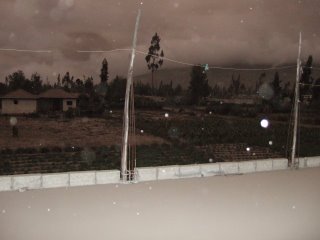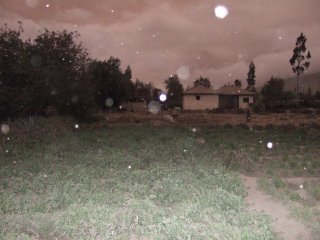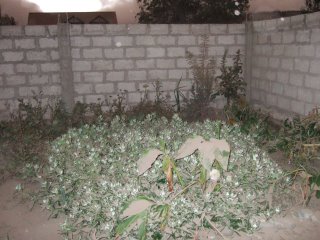



August 17th, 2006
Well folks, I never got around to writing an update about our third and fourth deliveries to communities around Cotaló. I have posted on the blog an email that John wrote about them with a few comments in brackets where I correct him, but otherwise it is more or less what happened. One thing he didn't mention that I would have is that the president of Bilbao was asking around about where the members of the community could buy a chunk of land to build new houses. Apparently the government was offering a totally appalling option that involved impressive cold and lack of water. He said that he thought they would just end up living in the same place as before. That is exactly what happened with Cusúa -- they had new houses built for them in 1999 in Chacauco, when the volcanic activity began again. Of course, they kept living in Cusúa and when the eruptive process grew stronger, moved to a shelter in Pelileo rather than go to their free government built houses in Chacauco, which itself was struggling with ash. Not too smart an emergency plan. This detail that John didn't mention becomes relevent later in this email.
It's been almost three weeks since we last helped anyone out, because we finished off the money that people gave and have been working hard on our masters degree theses. We had both hoped that things were calming down and that we had done our part in helping people out. Unfortunately, our help turns out to be very small compared to the magnitude of the problem. I went to Quito on Monday and spent a couple of days there on vacation. Rosa returned to Salasaca a day earlier than I did, and when I spoke to her on the phone last night, she told me that there were incredible explosions constantly shaking the house, much stronger than the previous time that I described in my first email (strong enough to make a small crack in one wall). Just as with the last time, the big explosions began just before sundown. This time there was cloud cover, but Rosa says that you could still see that the mountain lit everything up like an incandescent light bulb (a red one) because the explosions were so powerful.
This morning, when I called her from Quito, she said that everything was covered with ash in Salasaca. The wind had changed and rather than going in a south-easterly direction, it went in a north-easterly direction. I put more photos on the blog (http://gabrielmany.blogspot.com) that she took this morning. They were taken just before seven a.m., usually there is plenty of light at that time, but not today. The photos speak for themselves. They look kind of like snow, and my father-in-law's now famous house clearly is covered. You can also see my spinach patch, a photo taken from my brother-in-law's roof and another of our alfalfa. The guinea pigs will have to get used to eating sawdust.
I immediately decided to get myself to Salasaca and caught a bus first to Ambato, where I planned to catch another bus home. Until we got to Latacunga -- about halfway to my house -- there wasn't much news (in Quito nobody cares about anything that happens elsewhere, and that includes the President). However, in Latacunga it became clear that there was a bit of ash in the air. As we moved on from Latacunga, there began talk of our bus not being able to get through to Ambato because of military blockades. The bus driver put on a news radio and we got some updates. People in Ambato are encouraged not to waste water nor to leave their houses. The entire province of Tungurahua and parts of Cotopaxi (to the north), Chimborazo (to the south), and Bolívar (to the west) were being declared emergency areas. In Pillate, one of the communities we've helped, the ash was so heavy that it was breaking the roofs of some of the homes. The people from Bilbao, one of the communities we had most helped and who had been staying in the church in Cotaló, had moved back to Bilbao with their animals the previous day because they had given up on a good offer from the government, and now there were various people with unknown whereabouts. The town of Chacauco, which was the community we gave the most help to, had been evacuated and the river that Bilbao is situated on and that separates Chacauco from the mountain has been damned up by a lava flow, creating flood danger to add to the problems. Finally, the lava had been mostly spraying towards Baños and had blocked the road from Ambato to Baños, leaving the town isolated.
As we headed towards Salcedo (about halfway between Latacunga and Ambato) the ash got somewhat thicker, though it hadn't yet accumulated in large amounts on the ground. The traffic got slower and there seemed to be periodic police check points, though we weren't blocked from advancing. There was an army man behind me who actually seemed to be pretty knowledgeable. From what I understood, he had left Ambato that same morning and was now returning again to help his family. He said that in Ambato, there had been about an inch of ash fall. We talked a fair amount, with his predictions not being too optimistic. We entered and were leaving Salcedo when traffic really slowed down. The army guy got off the bus to check things out and I followed him, figuring that following him was probably as good an idea as any to make sure I got through to Ambato. I knew that he was going to find a way to get there, even if it meant walking and I knew that I also was going to, so staying with him seemed smart. It was. Shortly after getting off the bus, the driver decided to turn around and go back to Quito. The army guy saw another army guy zooming by in an unmarked station wagon, as he had special permission to get through the blockades. He hopped into the station wagon and asked the driver to take me on board too, which he kindly did, and we were off, the official team to go fix the helicopters in Riobamba. No other traffic was being allowed through, I was extremely lucky, otherwise I'd probably still be walking to Salasaca right now.
When we got to the northern outskirts of Ambato, the ash on the ground was very thick. I'd say that the ash was at least the equivalent of the ash John and I had seen in Laurel Pamba, the least damaged place we helped, and was likely as thick as in Pillate. That may not seem like a lot, but it is a pretty big deal for a city of a couple of hundred thousand people. We didn't go through the downtown, but rather took a new road that goes around the city, since the driver was headed to Riobamba. This road goes through the more rural areas around Ambato. While urban Ambato mainly just has to worry about the water supply and cleaning the ash off the streets, the farmers in rural Ambato were harvesting everything as fast as they could before it became worthless. On this road (which happens to go to the eastern edge of Ambato, the closest part to Salasaca which was convenient) visibility became very low, like fog. Fortunately, there wasn't much traffic, seeing as how people aren't allowed to use the roads. Finally, we got to the turnoff for Riobamba and the army driver dropped me off, without charging me a penny.
There were a lot of people there, including a number of Salasacas walking away from Ambato, homewards. They had gone to Ambato in the morning, thinking the day might involve normal business, and now the buses wouldn't take anyone onboard because the police wouldn't let them through if they did so. So, I found people I knew and started walking with them. It's not too long a walk, a few hours would get me home, and my bag was very light. Of course, it wasn't a very comfortable walk, I covered up my entire face with my shirt, so that I was walking blindly, but there wasn't much traffic, so it didn't really matter. I had to do that because my eyes and throat were burning a bit. The ash grew thicker. After a little while, a person from Salasaca with a pickup truck saw us and picked us up. He had to take us back on back roads, because since he was carrying passengers he wasn't allowed to go on the main road. I guess the authorities think that it's better for people to walk ten miles in awful ash than for pickup drivers to charge 50 cents and take them back quickly.
By around midday, only 4 hours after leaving Quito, I made it to Salasaca. That means because of my luck with alternative transportation, it only took me about an hour longer than it usually does for me to get home from Quito. I doubt many other people were so lucky. I got back to the house and saw Rosa. We are both very worried. As I've explained in other emails, there isn't danger from things like lava and rocks in Salasaca because we are a couple of valleys away from Tungurahua. However, the economic livelihood of the community is still dependent on the land and the animals and we don't know what is going to happen with them. The ash is at least as thick as it was in Pillate (though of course now Pillate is in much worse shape than it was in a month ago) and the crops will probably die and the grass and alfalfa the animals eat will probably also die.
Right now, we have sawdust and tasty pellets for our animals, but almost nobody else does. Rosa and I are going to visit her grandparents tommorow and will probably buy food for their animals.
That doesn't help the rest of the population. There are 18 communities in Salasaca, and on average they are about 50% larger than the 6 communities that John and I helped around Cotaló. I am in the process of seeing whether there is some way to work in a more official way helping people out, but right now I am too shell-shocked to really think well. A volcano is really a big deal. Some of the supersticious people here blame the mayor of Baños for the problem. He, of course, had said that the volcano was no danger and that tourists should come see the spectacle. He probably isn't so smug now. I don't think that his words have much influence on where a volcano shoots its lava, but I do think that he could have helped seem like preparing for an eruption was not very important.
Certainly, the government has done nothing to prepare, even though as I've repeatedly said, the amount of preparation necesary is minimal. They just don't care. Now, the only people who helped the last time, rural communities like Salasaca, are also in need of help. The problem is that the size of the task has become so enormous that I don't even have an idea of where to begin. Since I got back, I haven't heard or felt a single explosion and the wind seems to have headed back towards the south. The sky has cleared a bit, though most of the south, east, and west continues to be brown. I can only see a bit of the base of grandma, I have no idea what she really looks like. I hope we sleep well. Last night Rosa slept with Leoncito, who panicked and ended up vomiting all over the place, so she is exhausted, as am I after my trip. I'll try to keep people informed, though we didn't have electricity for most of the day, so that could be difficult.

0 Comments:
Post a Comment
<< Home